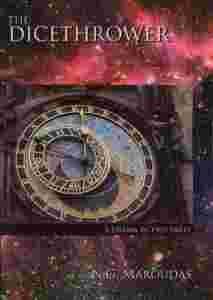N. G. Maroudas
The Dicethrower
A Drama in Two Parts
Matador / Troubador Publishing Ltd., 2010
stan bardzo dobry, książka nowa ale ze śladami składowania w magazynie
format 21 x 30 cm
waga 580 gramów
Ten dramat jest w języku angielskim / This drama is in English
Loosely based on the life and times of Albert Einstein, The Dicethrower is a poetic drama about the quest for certainty in an uncertain world. Dreistein, a physicist in Parallel Universe 3, seeks certainty in mathematics, knowing that to do so is to discard most of life. His wife, Mileva, abandons physics to make a secure home for her children. Their lifelong Jewish friend Michel finds in old age that there are no isms, there is only the call from the Cross. A host of characters look for certainty through money and military power. Time and chance baffle happen to all. Two physicists set out with clear questions about time and find strange answers about chance. A pacifist fails to live at peace with his wife, and initiates the project which bombed Hiroshima. A socialist Europhile lands up as a black sheep in capitalist USA. A scientific hero and celebrity, voted the Man of the Century, complains that everything he touched turned into mess. A country, which science helped to make great, holds a clearance sale of its brains. We see the increasing politicization of science as the search for truth begins to deliver power: the Military-Industrial Complex. The drama is in two parts. Part 1, World War 1, shows "men of the greatest possible culture behaving as though their brains had been amputated": producing the chemical explosives and "chemical weapons of mass destruction" - white phosphorus and phosgene - which are still in use. Part 2, World War 2, shows scientists of the highest possible reputation for pacifism and philosophy initiating the nuclear explosives and nuclear poisons which are a million times worse - and still with us, only more so. We hope there will be no part 3 because Part 3 would have to be World War 3.
But, like Galileo Galilei by Bertholdt Brecht, this drama aims to present poetry and passion as well as science and history. The physics are as accurate and up-to-date as the author could make them after consulting books by first class physicists and reading some of the original papers; the main biographical and historical facts are as accurate as human affairs would allow. So, read as prose, it forms quite an interesting potted digest of physics and war in '"the world of yesteryear". Nevertheless, this is not a docu-drama: it is set in a parallel universe; the hero has a different name; the play opens and closes deliberately in the manner of a fantasia; and there are interludes of poetry, song, music - even a ballet of ideological gymnastics. By this means the element of dramatic poetry is released without the awful responsibility of trying to do justice to the motives of real people, living or dead. The characterization ranges from idealisation (Mileva) through more or less sketchy realism (most of these fictional characters) to caricature and downright demonization (Wieland/Wayland). The style of presentation for different scenes varies from comedy or pathos (for private faces) to slapstick or tragic farce (in public places). It has been said that History repeats itself - first as tragedy and then as farce. The relevance of these fictional characters is not their history but our present - and our future.

